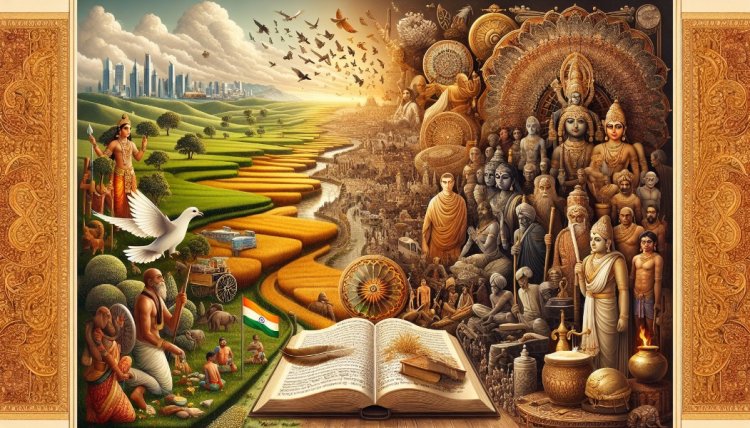A Journey Through India's Rich History
From ancient Indus Valley to modern tech hub, unravel India's vibrant tapestry. Explore its rich history, booming present, and exciting future: a land of ancient wisdom, modern innovation, and boundless potential.

Introduction
India has a rich and dynamic past interwoven with stories of strength, upheaval, and rejuvenation. Understanding the present depends on understanding the past. As part of this blog, we will embark on a narrative journey, using the art of storytelling to unravel the intricate tapestry that encapsulates India's rich and vibrant history. From the venerable Indus Valley civilization to the valiant struggle for independence, each era has left a lasting impression on India's magnificent soil.
Our expedition begins amidst the lush meadows of the Indus Valley, where one of mankind's oldest urban civilizations thrived. The development of written language within this civilization bears testimony to a high degree of intellectual progress and cultural articulation.
Next, we move to the brilliant Vedic era, an outstanding epoch characterized by profound philosophical and intellectual advances. The ideas of karma, dharma, and samsara had a great influence on the philosophical foundations of Hinduism, Buddhism, and Jainism.
Next, we will look at the era of empires, where the famous Maurya and Gupta dynasties held a key position in the great history of India. During the reign of King Ashoka, the famous Maurya empire zealously propagated the teachings of Buddhism while leaving behind enduring edicts that exemplified a ruler's unwavering commitment to the welfare of his subjects. The Gupta Empire, regarded as the glorious Golden Age of India, witnessed remarkable advancements in the fields of science, technology, art, literature, and philosophy.
The subsequent era was characterized by the arrival of foreign invasions and influences, especially the incursions of the Delhi Sultanate and the Mughal Empire. These eras brought with them a harmonious fusion of cultures and left an indelible mark on Indian identity. This is evident in the exquisite fusion of Islamic and Indian traditions that can be found everywhere.
In the 17th century, European explorers, most notably the prestigious British East India Company, graced the holy land of India with their presence. Over time, their mere existence transformed into the establishment of British colonial rule, which ushered in the advent of English education, a legal framework, and modern administrative structures. Nevertheless, the exploitative policies of the British led to a state of misery and social stratification that was widespread.
A pivotal period in Indian history, the struggle for independence saw acts of resistance and the rise of well-known figures like Mahatma Gandhi. Gandhi's philosophy of non-violent resistance resonated with the general public and sparked significant civil disobedience movements. In 1947, India finally gained its long-awaited independence, but the partition of the country led to severe social and political unrest.
After the dust settled, India emerged as a democratic republic, unwaveringly committed to the noble goal of nation-building. The Indian Constitution has made the nation a secular and democratic state, guaranteeing equal rights to every citizen. Despite challenges such as poverty, corruption, and social inequality, India has made remarkable progress in economic development thanks to its young population and thriving democratic system.
From the venerable Indus Valley civilization to the exuberant dynamism of today's India, the history of this country is a reflection of strength, upheaval, and rejuvenation. The threads of India's past have woven the vibrant tapestry of the present and illuminated the path to the future.
The Indus Valley Civilization
The Indus Valley Civilization, a magnificent urban civilization of great antiquity, flourished in the fertile plains of the Indus Valley from 3,300 to 1300 B.C. This esteemed civilization was characterized by carefully organized urban centers, sophisticated systems of water management, and impressive architectural marvels. The development of writing, which is still shrouded in mystery and has yet to be deciphered, is a testament to the intellectual prowess and cultural sophistication of this culture.
The Indus Valley Civilization can boast of remarkable achievements, especially its impeccably structured urban centers and sophisticated sanitation systems. The urban centers were characterized by a carefully planned street layout that featured a grid-like pattern and carefully divided the cityscape into different sectors for residential, commercial, and public areas. The ancient civilization also had an extensive and far-reaching trade network that reached as far as Mesopotamia, demonstrating its flourishing trade.
The emergence of written language in the Indus Valley Civilization is of great significance, as it is a testament to the intellectual prowess and cultural sophistication of this ancient society. Although the writing in question remains enigmatic and elusive, its very existence is a testament to the sophistication of this civilization's intricate means of communication and the great importance they placed on the preservation of written documents.
Trade networks played a crucial role in the prosperity of the Indus Valley civilization. The esteemed civilization had an extensive and intricate trade network that facilitated its connection with different regions, especially Mesopotamia. This process facilitated the exchange of goods, concepts, and cultural influences, contributing significantly to the progress and maturation of civilization.
The Vedic Period
The Vedic Age, which extended from 1500 to 500 BC, marked a significant period of profound philosophical and intellectual progress in ancient India. Paying homage to the Vedas, the ancient scriptures of Hinduism, this era played a crucial role in shaping the philosophical foundations of Hinduism, Buddhism, and Jainism.
The varna, or social class, of each individual, determined his or her role and duties in the carefully organized hierarchies of the Vedic period. This hierarchical organization exerted a profound influence on Indian society and shaped its social, political, and economic framework for centuries to come.
This era saw a remarkable flowering of thought, with profound philosophical concepts such as karma, dharma, and samsara coming to the fore. These principles formed the foundation of Hindu philosophy and had a great influence on the development of Buddhism and Jainism. Adherence to the concept of karma, the principle of causality, emphasizes individual responsibility and the effects of one's actions. Dharma, the embodiment of moral and ethical obligations, guides people in their daily endeavors, while samsara, the eternal cycle of birth, demise, and rebirth, serves as a profound framework for understanding the nature of existence.
The Vedic age laid the foundation for the spiritual and philosophical customs that influence Indian culture and spirituality to this day. With its hierarchical social structure and profound notions of karma, dharma, and samsara, this era laid the foundation for the intricate web of ideas and beliefs that characterize India's illustrious history.
The Age of Empires: Maurya and Gupta
The famous King Ashoka, the ruler of the Maurya Empire, had a significant impact on India's long history. The principles and advocacy of King Ashoka have left an indelible mark on the religion of Buddhism. The proclamations carefully engraved on pillars and stones throughout his vast domain are an enduring testimony to a ruler's unwavering devotion to the welfare and ethical upliftment of his subjects. The principles of compassion, non-violence, and social justice have struck a chord with the masses and have had a lasting impact on the teachings of Buddhism to this day.
The Gupta Empire, known as the Golden Age of India, was a time of extraordinary achievements. This era saw a remarkable flowering of progress in the fields of science, technology, art, and philosophy. During the glorious era of the Gupta period, there were remarkable advances in science and technology, especially in the fields of metallurgy, shipbuilding, and medicine. The concept of zero and the decimal system were also introduced, revolutionizing the fields of mathematics and astronomy.
The Gupta Empire also had a profound and lasting influence on the arts. Literature flourished, producing remarkable masterpieces such as the esteemed Kamasutra and the profound writings of Kalidasa. The empire's generous support for the arts led to the creation of magnificent sculptures and temple architecture, such as the famous temples of Ajanta and Ellora. The fields of philosophy and religion also experienced remarkable progress during this period: Hinduism emerged and Buddhist and Jain ideologies flourished.
The Era of Empires was a time of profound intellectual progress, vibrant cultural exchange, and enduring social conventions that continue to influence the fabric of India to this day. It was an era of authority and triumph, but also a time of extraordinary achievements and contributions that have left a lasting impression in the opulent annals of India's past.
Foreign Invasion and Cultural Fusion
The history of India is a captivating tale of strength, upheaval, and rejuvenation. The emergence of European explorers, most notably the prestigious British East India Company in the 17th century, ushered in a new and momentous era in India's history. British colonial rule exerted a profound influence on Indian society and bestowed upon it a complex web of favorable and unfavorable consequences.
The arrival of the European explorers
The esteemed British East India Company, originally founded as a reputable trading company, gradually transformed into a formidable political entity and eventually paved the way for British colonial rule in the famous land of India. This marked the beginning of an era characterized by profound changes in the socio-cultural fabric of India.
Impact of British colonial rule
With the onset of British colonial rule in India, English education, legal institutions, and modern administrative systems were introduced. These advances had a profound and lasting impact on the nation and shaped its legal and educational framework. However, the exploitative policies of the British also led to a state of misery and social stratification.
Positive contributions and negative effects
The influence of the British government on Indian society had both positive and negative consequences. On the one hand, it ushered in the era of modern education and administration, laying the foundation for India's progress and development. On the other hand, it shamelessly exploited India's abundant resources, leading to impoverishment and exacerbating social divisions.
Cultural fusion and influence of Islamic traditions
The invaders from distant lands, especially the Delhi Sultanate and the Mughal Empire, led to a harmonious fusion of cultures in the Indian Empire. The rich tapestry of Islamic traditions and influences permeated the vibrant Indian lifestyle and led to a captivating fusion of Indian and Islamic customs. This harmonious fusion has left an indelible mark on the fabric of Indian identity and continues to exert a timeless appeal even today. The fusion of these elements is palpable in the fields of art, architecture, and language.
India's Fight for Independence
India's struggle for independence was a crucial period in its history, one that saw rebellion and the rise of well-known figures like Mahatma Gandhi. In 1857, the Indian Rebellion was a momentous event in which the Indian subcontinent witnessed a resounding symphony of unity against the yoke of British rule. This uprising ignited a fiery flame of nationalism that ate through the hearts and minds of the people. The culmination of this collective discontent eventually led to the formation of the Indian National Congress in 1885, which was a significant event in India's arduous quest for liberation.
Mahatma Gandhi, a towering luminary amid the liberation struggle, introduced the profound doctrine of non-violent resistance known as Satyagraha. The famous Salt March of 1930 is a notable example of how this ideology resonated with the general public and sparked significant civil disobedience uprisings. Gandhi's quiet demonstrations resonated throughout the British Empire and inspired people around the world.
In 1947, India gained its long-awaited independence, albeit at a high price. The partition of India and Pakistan triggered one of the largest migrations in human history and led to profound social and political unrest. Countless people were displaced from their homes, while communal riots broke out in various places.
As the dust gradually settled, India emerged as a democratic republic dedicated to the noble goal of nation-building. The Constitution adopted in 1950 laid the foundation for India to be recognized as a secular and democratic nation with equal rights for every individual. Against all odds, such as poverty, corruption, and social inequality, India has made remarkable progress in economic growth thanks to its vibrant democracy and the vitality of its young population.
The struggle for autonomy and the subsequent establishment of a democratic nation have had a lasting impact on India's history. The unwavering bravery and tenacity of the Indian people during this period have been etched in the collective consciousness of the nation and are a poignant testimony to the power of solidarity and the unwavering quest for emancipation.
India as a Democratic Republic
India's journey as a democratic republic began after the attainment of independence in 1947. The post-independence period marked an important turning point in India's history when the country adopted its constitution, laying the foundation for a secular and democratic state.
The Indian Constitution, ratified in 1950, cemented India's status as a secular state and guaranteed the cherished principles of religious freedom and equal treatment of every individual. This esteemed document has given us a great framework for governing our society, protecting our cherished fundamental rights, and promoting the noble cause of social justice.
India's democracy exudes vibrancy and dynamism as it allows for regular elections, allowing its citizens to actively participate in the democratic process and elect their representatives. The country has a multi-party system that allows for diverse political opinions and promotes a healthy democratic discourse.
Nevertheless, India faces several challenges on its path to progress. A large part of the population lives below the poverty line and continues to suffer from poverty. Corruption is a major threat to the progress of our country, as it hampers economic prosperity and severely affects the livelihood of citizens.
Despite these formidable obstacles, India has made commendable progress in economic growth in recent times. The country's growing young population and vibrant democratic system have been instrumental in driving this remarkable progress. India has emerged as one of the fastest-favourishing major economies in the world, attracting global investment and raising its profile on the international stage.
India's journey as a democratic republic is a testimony to the unwavering strength and steadfast resolve of its citizens. Despite the challenges that lie ahead, the unwavering commitment to democracy and the relentless pursuit of all-around progress characterize the country's journey ahead.
Conclusion
On our journey through the opulent chronicles of India, we have come to know the intricate structure of strength, upheaval, and rejuvenation. From the glorious Indus Valley civilization of antiquity to the resplendent democracy of modern India, a harmonious interplay of continuity and change has shaped the destiny of the country over the centuries.
The Indian people have shown remarkable resilience and determination, overcoming foreign invasions, colonial rule, and social upheavals. The indomitable spirit that they possess has served as a beacon, leading India to liberation and the formation of a democratic nation-state.
The history of India is a testimony to the indomitable force of unity and the unwavering pursuit of freedom. The interwoven strands of history have artfully woven the magnificent tapestry of the present and paved the way to a bright future.
FAQ
What is the significance of studying India's history?
The study of Indian history is of utmost importance for understanding the current situation. It offers deep insights into the cultural, social, and political evolution of the nation and enables us to truly comprehend and admire the opulent mosaic that is India.
To what extent did the incursions of foreign powers influence the development and evolution of Indian culture?
With the advent of foreign invasions, such as the Delhi Sultanate and the Mughal Empire, the Indian subcontinent witnessed a harmonious fusion of different cultures. The harmonious fusion of Islamic traditions and influences with Indian customs has resulted in an unmistakable blend that still characterizes Indian culture today.
What were the pivotal elements that contributed to India's struggle for emancipation?
The acts of defiance and the rise of famous leaders like Mahatma Gandhi served as catalysts for India's arduous struggle for liberation. Gandhi's non-violent stance of resistance resonated with the general public and sparked significant civil disobedience movements that eventually led to India's independence in 1947.
What are the trials and triumphs faced by contemporary India?
India today faces formidable obstacles in the form of poverty, grievances, and social inequalities. Yet the country has achieved extraordinary economic growth and has emerged as one of the fastest-growing major economies in the world. India's vibrant democracy and young population, both of which contribute significantly to its progress, greatly enhance its presence on the international stage.
In what manner has the historical backdrop of India shaped its contemporary society?
The rich history of India has undeniably exerted a profound and indelible influence on the structure of contemporary society. Ancient civilizations, empires, foreign invasions, and the arduous quest for independence have significantly influenced the cultural, political, and economic aspects of Indian society. The intricate threads of Indian history have gracefully woven themselves into the vibrant fabric of the present and shed a bright light on the journey to the future.



 admin
admin 










